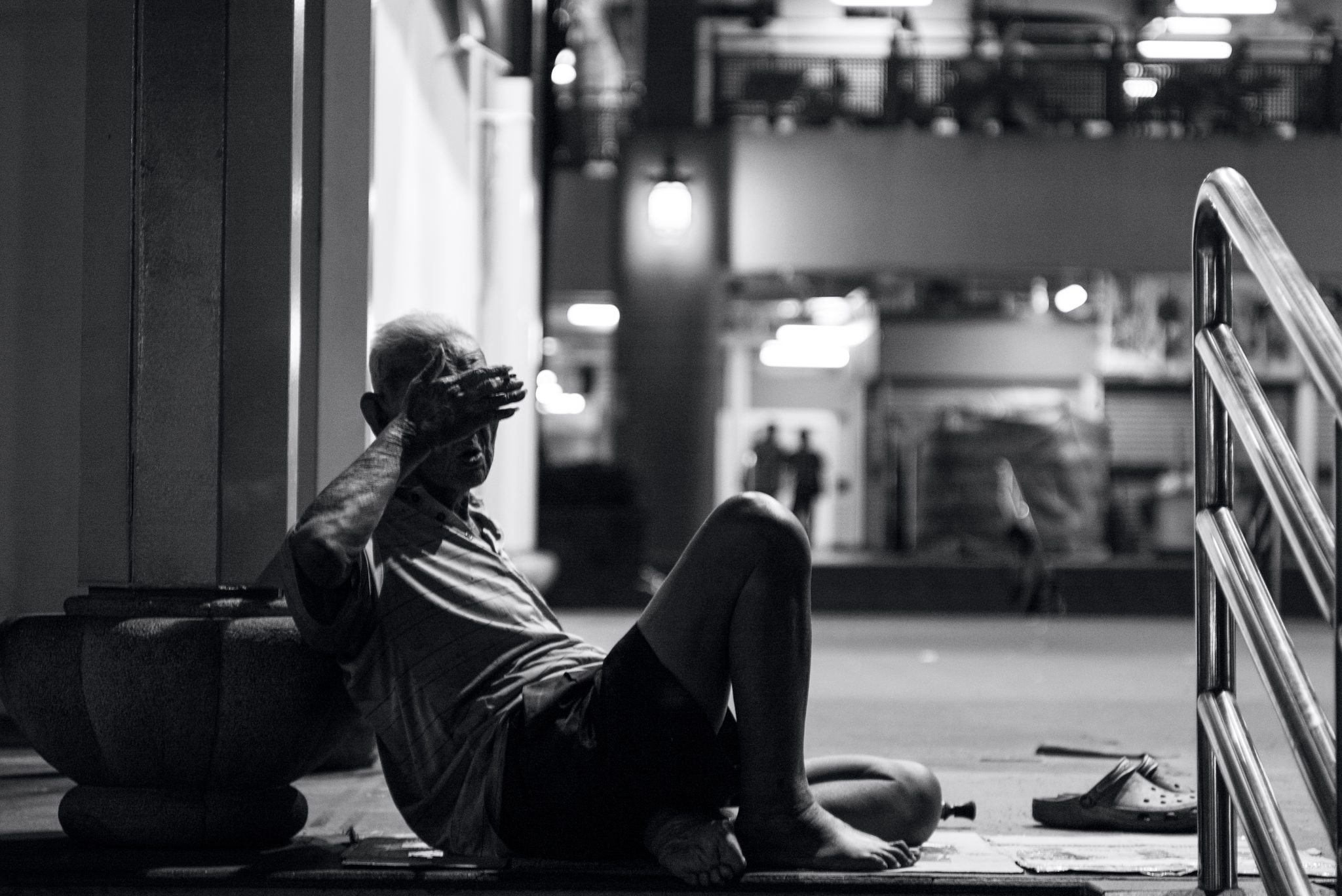Homeless during the pandemic: how our Sayang Sayang Fund responded with agility


When Singapore locked down during the pandemic, homelessness became a visible, urgent issue. Cross-border commuters and people that had lost their housing due to irregular income or family conflict joined the rough sleepers who scrape by on the margins of our society.
But with any crisis, there is an opportunity to make things better. In this instance, the authorities and social service organisations moved quickly, joining forces to provide temporary shelters. “The rapid expansion of overnight shelter capacity – from around 60 places at the start of 2020 to a peak of 920 during the circuit breaker – was a considerable feat and evidence of what can be achieved with bureaucratic will and an active civil society,” notes a new study called Seeking shelter: Homeless during the COVID-19 pandemic in Singapore.
Conducted by the Lee Kuan Yew School of Public Policy (LKYSPP), this landmark study was funded by the Community Foundation of Singapore’s Sayang Sayang Fund(SSF). SSF decided to fund this research project to gain deeper insights into the issue of homelessness and how charities can better meet this critical gap.
The study involved a nationwide street count in 2021 and in-depth interviews and was led by Dr. Ng Kok Hoe, a senior research fellow and head of the Social Inclusion Project at LKYSPP. Dr. Ng and his team found that in 2021, the number of homeless people who took refuge in temporary shelters shot up six-fold to 420 compared to 2019.
Shelters offer greater safety, protection from the elements, and access to basic amenities. At one point during the circuit breaker, homeless shelters reached capacity. “Homelessness is one of the harshest forms of social exclusion,” the study points out. To be homeless in a pandemic, it adds, is to experience even sharper dislocation and hardship.
Protecting people living on the streets during a public health crisis was one of the many challenges SSF stepped in to address swiftly. SSF was launched in February 2020 as an emergency Community Impact Fund (CIF) during the early days of Covid-19. It was designed to support frontline and healthcare workers.
Donors responded with overwhelming generosity to our appeal. SSF raised a total of $9.6 million from multiple platforms, tripling our initial target. A campaign on Giving.sg alone raised $1 million in donations from the public. All this helped turn SSF into our largest and most impactful pooled fund to date.
As the pandemic unfurled, unmet needs among vulnerable groups in Singapore escalated. Our deep understanding of on-the-ground issues and strong relationships with charities and government agencies meant CFS could form strategic partnerships to channel funds to the needy in the fastest and most effective way.
As part of its SafeSleep@Home initiative, SSF gave a $417,000 grant to four charity partners – AMKFSC Community Services, Good News Community Services, Methodist Welfare Services, and New Hope Community Services. The money covered daily necessities, furnishings, and other costs associated with sheltering over 476 rough sleepers.
As of December 2020, about 10% gained permanent housing.
“Collaboration and trust are key in times of crisis,” says Joyce Teo, executive director at the Centre for Applied Philanthropy at CFS. Aside from rallying donor support, CFS tapped on its extensive cross-sector network to generate diverse perspectives, allowing SSF and other stakeholders to respond efficiently and collectively to the homelessness dilemma.
To date, SSF has launched ten programmes. The fund has also worked with 891 grantee organisations and touched the lives of 359,302 beneficiaries. It is a powerful example of how collaborative philanthropy can tackle societal problems with agility.
“The crisis created opportunities for different stakeholders and built new partnerships. It was also a useful learning curve,” notes Joyce. The learnings from this, plus the research findings from Seeking shelter, put CFS in a better position to deliver services to the homeless. “All these work together to help us build a more resilient community better equipped to deal with future crises,” she adds.
To learn more about the Sayang Sayang Fund and its impact, please click here.
This article was written by Sunita Sue Leng, a former financial analyst and journalist who believes that the written word can be a force for good. She hopes to someday write something worth plagiarising.
Disclaimer: The opinions expressed in this publication are those of the author. They do not purport to reflect the opinions or views of CFS or its members.
References
Ng, K. H., & Sekhon Atac, J. S. (2022). Seeking shelter: Homeless during the COVID-19 pandemic in Singapore. Singapore: Lee Kuan Yew School of Public Policy. https://lkyspp.nus.edu.sg/research/ social-inclusion-project
When Singapore locked down during the pandemic, homelessness became a visible, urgent issue. Cross-border commuters and people that had lost their housing due to irregular income or family conflict joined the rough sleepers who scrape by on the margins of our society.
But with any crisis, there is an opportunity to make things better. In this instance, the authorities and social service organisations moved quickly, joining forces to provide temporary shelters. “The rapid expansion of overnight shelter capacity – from around 60 places at the start of 2020 to a peak of 920 during the circuit breaker – was a considerable feat and evidence of what can be achieved with bureaucratic will and an active civil society,” notes a new study called Seeking shelter: Homeless during the COVID-19 pandemic in Singapore.
Conducted by the Lee Kuan Yew School of Public Policy (LKYSPP), this landmark study was funded by the Community Foundation of Singapore’s Sayang Sayang Fund(SSF). SSF decided to fund this research project to gain deeper insights into the issue of homelessness and how charities can better meet this critical gap.
The study involved a nationwide street count in 2021 and in-depth interviews and was led by Dr. Ng Kok Hoe, a senior research fellow and head of the Social Inclusion Project at LKYSPP. Dr. Ng and his team found that in 2021, the number of homeless people who took refuge in temporary shelters shot up six-fold to 420 compared to 2019.
Shelters offer greater safety, protection from the elements, and access to basic amenities. At one point during the circuit breaker, homeless shelters reached capacity. “Homelessness is one of the harshest forms of social exclusion,” the study points out. To be homeless in a pandemic, it adds, is to experience even sharper dislocation and hardship.
Protecting people living on the streets during a public health crisis was one of the many challenges SSF stepped in to address swiftly. SSF was launched in February 2020 as an emergency Community Impact Fund (CIF) during the early days of Covid-19. It was designed to support frontline and healthcare workers.
Donors responded with overwhelming generosity to our appeal. SSF raised a total of $9.6 million from multiple platforms, tripling our initial target. A campaign on Giving.sg alone raised $1 million in donations from the public. All this helped turn SSF into our largest and most impactful pooled fund to date.
As the pandemic unfurled, unmet needs among vulnerable groups in Singapore escalated. Our deep understanding of on-the-ground issues and strong relationships with charities and government agencies meant CFS could form strategic partnerships to channel funds to the needy in the fastest and most effective way.
As part of its SafeSleep@Home initiative, SSF gave a $417,000 grant to four charity partners – AMKFSC Community Services, Good News Community Services, Methodist Welfare Services, and New Hope Community Services. The money covered daily necessities, furnishings, and other costs associated with sheltering over 476 rough sleepers.
As of December 2020, about 10% gained permanent housing.
“Collaboration and trust are key in times of crisis,” says Joyce Teo, executive director at the Centre for Applied Philanthropy at CFS. Aside from rallying donor support, CFS tapped on its extensive cross-sector network to generate diverse perspectives, allowing SSF and other stakeholders to respond efficiently and collectively to the homelessness dilemma.
To date, SSF has launched ten programmes. The fund has also worked with 891 grantee organisations and touched the lives of 359,302 beneficiaries. It is a powerful example of how collaborative philanthropy can tackle societal problems with agility.
“The crisis created opportunities for different stakeholders and built new partnerships. It was also a useful learning curve,” notes Joyce. The learnings from this, plus the research findings from Seeking shelter, put CFS in a better position to deliver services to the homeless. “All these work together to help us build a more resilient community better equipped to deal with future crises,” she adds.
To learn more about the Sayang Sayang Fund and its impact, please click here.
This article was written by Sunita Sue Leng, a former financial analyst and journalist who believes that the written word can be a force for good. She hopes to someday write something worth plagiarising.
Disclaimer: The opinions expressed in this publication are those of the author. They do not purport to reflect the opinions or views of CFS or its members.
References
Ng, K. H., & Sekhon Atac, J. S. (2022). Seeking shelter: Homeless during the COVID-19 pandemic in Singapore. Singapore: Lee Kuan Yew School of Public Policy. https://lkyspp.nus.edu.sg/research/ social-inclusion-project
- Related Topics For You: CHARITY STORIES, COLLABORATION, COMMUNITY IMPACT FUND, DIRECT AID, DONOR STORIES, INCLUSIVITY & INTEGRATION, OPINION, PARTNERSHIP STORIES, SAYANG SAYANG FUND


